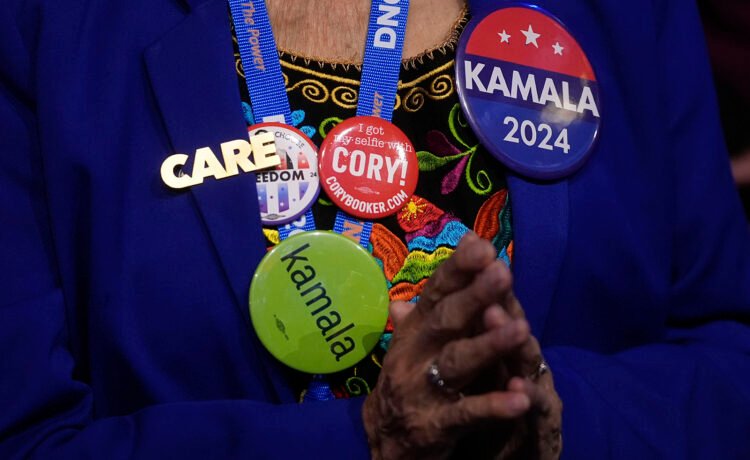(RNS) — Before Christmas, The New York Times ran a piece by political reporter Katie Glueck offering up religion as a way to bring Democrats out of the political wilderness. Among her examples of next-gen Dems who have the right spiritual stuff is state Rep. James Talarico of Texas, a ministerial student who gained a bit of prominence in 2023 when he denounced a Republican bill mandating the display of the Ten Commandments in every public school classroom in the state, calling the measure not only unconstitutional and un-American but also “deeply un-Christian.”
“Progressives have got to understand that the separation of church and state is not the separation of faith and politics,” Talarico told Glueck. “Unless we do, we’re going to keep losing elections.”
Déjà vu all over again? Well, we’ve been here before.
Two decades ago, Democrats became aware of what came to be called the God Gap — the propensity of weekly worship attenders of all faiths to vote Republican by a margin of 60%-40%. In 2004, up-and-coming Illinois state Sen. Barack Obama signaled a concern about this phenomenon in his Democratic National Convention keynote address when he insisted, “We worship an awesome God in the Blue States.”
After John Kerry lost the subsequent presidential election to the notably faith-based George W. Bush, the new chair of the Democratic Party, former Vermont Gov. Howard Dean, undertook to remedy the situation. Committing his party to a 50-state electoral strategy, he tasked his chief of staff, part-time Pentecostal minister Leah Daughtry, with assembling a Faith in Action group to do religious outreach. Meanwhile, House Minority Leader Nancy Pelosi created her own Faith Working Group.
Helped not a little by President Bush’s ill-advised post-reelection advocacy of Social Security privatization and an increasingly unpopular war in Iraq, the efforts of Dean and Pelosi bore amazing fruit in 2006 when the Democrats flipped both houses of Congress.

President Barack Obama, first lady Michelle Obama and daughters Malia and Sasha attend Easter church service at Shiloh Baptist Church in Washington, D.C., on April 24, 2011. (Official White House Photo by Pete Souza)
Two years later, the lesson was not lost on Democratic presidential wannabes. Obama the Congregationalist and Hillary Clinton the Methodist both undertook major religious campaign efforts, up to and including high-profile sessions with religious leaders.
But religion did not do so well for Obama during his first term in office. His charm offensive with white evangelicals proved fruitless, while an increasingly Islamophobic Republican right enjoyed some success portraying him as a crypto-Muslim.
Meanwhile, the God Gap gave way to the Rise of the Nones as the religion-and-politics meme of the moment. Between the mid-1990s and 2012, the proportion of Americans who gave their religious identity as “none” grew from the mid-single digits to 20% of the population. Why should Democrats worry about their shortage of religious voters when more and more Americans no longer had a religion?
The 2012 election cycle thus saw a notable dearth of faith-based campaigning on the Democratic side. At the top of the ticket, Obama dialed back his religion agenda. Hillary Clinton followed suit in 2016.
In 2020, to be sure, Joe Biden made no secret of his old-time urban Catholicism, and it seems to have done him some good among old-time urban Catholics in the blue wall states that carried him to victory. But in line with prevailing Democratic attitudes, Kamala Harris did not lean in to her Christian identity during her foreshortened presidential run last fall.

President Joe Biden and first lady Jill Biden walk between tombstones to attend Mass at St. Joseph on the Brandywine Catholic Church in Wilmington, Del., on Sunday, Dec. 18, 2022. (AP Photo/Manuel Balce Ceneta)
So should Democrats hit the sawdust trail and, next time around, campaign like it was 2006?
I’ll leave it to the statisticians to do the regression analysis to determine whether worship attendance is the independent variable it used to be, but these days politics increasingly appears to be driving religiosity rather than the other way around. In the age of Trump, moreover, a candidate’s religious identity — to say nothing of the moral behavior that’s supposed to accompany it — seems to matter less and less.
This is not to suggest that Democratic candidates refrain from communicating their religious commitments to voters or make no effort to listen and respond to voters’ religious concerns. They just shouldn’t expect it to make as much of a difference as it once did.















